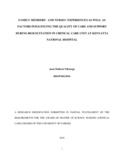Family Members’ and Nurses’ Experiences as Well as Factors Influencing the Quality of Care and Support During Resuscitation in Critical Care Unit at Kenyatta National Hospital
Abstract
Introduction: Resuscitation is a very common practice in the critical care. The experiences that come as a result can bring about emotional and psychological stress to both nurses and family members. In most instances, adequate care and support is not offered to the nurses and the family members. Study Objective: The main study objective was to investigate the views, experiences as well as factors that influence the quality of care and support given to nurses and family members during resuscitation in Critical Care Unit at KNH. Methodology: The study was conducted in Kenyatta National Hospital whereby a mixed study design was used. The study recruited 52nurses working in the main CCU and 10 family members whose relatives had been resuscitated. Stratification and simple random sampling technique were used to sample the nurses for the quantitative data. A purposive sampling technique was applied for the qualitative data to interview the 10 family members and 15 nurses up until saturation point was achieved. Data Collection and analysis: Qualitative data was collected using interviews as per the objectives and then analyzed using NVivo software 11 where themes and sub- themes that constituted narrative based on research objectives were generated. Quantitative data was collected using a structured questionnaire and analyzed using Statistical Package for Social Scientists software Version 23.0. It was summarized in form of tables, graphs and pie charts. Results: The study results were that majority 55.8%, (n=29) of the nurses do resuscitation daily. Most of the nurses 86.5%, (n=45) agreed that resuscitation caused excessive workloads and increases nurses stress levels. On whether adequate care and support was offered during resuscitation, only 7.7% (n=4) agreed that they receive care and support in form of debriefing with only 21% (n=11) acknowledging that debriefing guidelines are available. Inferential statistics were used to show the relationship between nurses’ demographic data and the care and support during resuscitation. There was a significant relationship between nurses level of education (p<0.016) nurses cadre (p<0.03) and resuscitation training (p<0.042) with the quality of care and support during resuscitation. Logistic multiple regression was used which further identified statistical significance between nurses gender[r=0.34; 95% CI 0.020-0.358; p-value=0.029] and nurses years of experience [r=0.34; 95% CI -0.448—0.055; p-value=0.013] with their experiences on quality of care and support during resuscitation. Several themes emerged from the interviews which included stress, lack of adequate care and support among others. Several patient related factors that would influence care and support during resuscitation including patient’s age, diagnosis/prognosis emerged from the interviews. Most family members interviewed expressed that care and support was not given to them during the resuscitation. Conclusion: There were several gaps that emerged in the study. Most nurses and family members were not given adequate care and support (debrief) during resuscitation and no protocols existed on the same. Recommendations: Nurses and family members need regular care and support (debriefing) during resuscitation. The researcher recommended that the Critical Care Unit and the institution develop protocols, guidelines and a policy on how nurses and family members are supported and cared for during resuscitation.
Publisher
University of Nairobi
Rights
Attribution-NonCommercial-NoDerivs 3.0 United StatesUsage Rights
http://creativecommons.org/licenses/by-nc-nd/3.0/us/Collections
- Faculty of Health Sciences (FHS) [4302]
- Theses & Dissertations [241]
The following license files are associated with this item:


